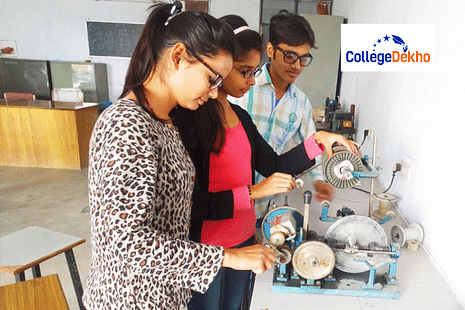List of Polytechnic courses 2024 include Diploma in Motorsport Engineering, Diploma in Genetic Engineering, Diploma in Electrical Engineering, Diploma in Civil Engineering and more. The fee structure of polytechnic diploma courses is also lower as compared to an engineering degree.
- About Polytechnic Courses in India
- List of Popular Polytechnic Courses 2024
- Polytechnic Courses List After 10th
- Polytechnic Courses After 12th Class
- Difference between Polytechnic and B Tech Courses
- Polytechnic Admission Process 2024
- Documents Required for Admission in Polytechnic Courses 2024
- State-wise Admission in Polytechnic Courses 2024
- Eligibility Criteria for Polytechnic Courses 2024
- Polytechnic Course Fees 2024
- Polytechnic Subjects & Syllabus
- Why Choose Polytechnic Courses?
- What after Polytechnic Courses?
- 10 Best Colleges for Polytechnic Courses in India
- Faqs

Polytechnic courses are also known as Diploma in Engineering courses that concentrate on providing technical education in Engineering. Polytechnic courses have a duration of 3 years, after completion of which candidates receive a diploma level certificate. Many top engineering institutions offer diploma courses in several specialisations such as ECE, Computer Science, Mechanical, and others. For admission to polytechnic courses, candidates are required to score a minimum of 40% marks in their last qualifying examination with PCM subjects with English, Mathematics, and Science as compulsory subjects.
Polytechnic admission in India is done either on the basis of merit or entrance exams. Some of the popular entrance exams are AP POLYCET, TS POLYCET, CG PPT, JEXPO, JEECUP, etc. Some of the top government institutes for Diploma in Engineering courses are Government Polytechnic (GP), V.P.M.'s Polytechnic, S. H. Jondhale Polytechnic (SHJP), Government Women Polytechnic College (GWPC), etc. The course fee for Polytechnic ranges from Rs. 10,000 to Rs. 5,00,000 depending on the type of institute. Read this article to learn more about the different Polytechnic courses 2024, popular specialisations, entrance exams required, admission process, and more.
About Polytechnic Courses in India
Polytechnic in India is popularly known as Diploma in Engineering course. The polytechnic courses are ideal for students who wish to build their career in Engineering fields but do not want to or cannot attain that destination via the usual path of getting a bachelor’s degree in engineering. Polytechnic courses are diploma-level programs that the students can enroll in and later on they can defer to a B Tech (Bachelor of Technology) or B E (Bachelor of Engineering) course to pursue a career in engineering. B.Tech lateral entry admissions 2024 is also possible after pursuing a polytechnic course through which candidates will be directly given admission to 2nd year of BTech programmes. Polytechnic courses focuses on giving students an insight into the technicality of engineering and its subjects.
List of Popular Polytechnic Courses 2024
Candidates can check the list of popular specialisations offered under polytechnic given below:
| Polytechnic Courses in India | |
|---|---|
| Diploma in Motorsport Engineering | Diploma in Environmental Engineering |
| Diploma in Production Engineering | Diploma in Metallurgy Engineering |
| Diploma in Dairy Technology and Engineering | Diploma in Infrastructure Engineering |
| Diploma in Food Processing and Technology | Diploma in Power Engineering |
| Diploma in Agricultural Engineering | Diploma in Biotechnology Engineering |
| Diploma in Genetic Engineering | Diploma in Plastics Engineering |
| Diploma in Mining Engineering | Diploma in Automobile Engineering |
| Diploma in Aerospace Engineering | Diploma in Petroleum Engineering |
| Diploma in Electronics and Telecommunication Engineering | Diploma in Instrumentation and Control Engineering |
| Diploma in Aeronautical Engineering | Diploma in IT Engineering |
| Diploma in Chemical Engineering | Diploma in Mechanical Engineering |
| Diploma in Art and Craft | Diploma in Interior Decoration |
| Diploma in Fashion Engineering | Diploma in Ceramic Engineering |
| Diploma in Electrical Engineering | Diploma in Electronics and Communication |
| Diploma in Civil Engineering | Diploma in Automobile Engineering |
| Diploma in Computer Science and Engineering | Diploma in Textile Engineering |
Polytechnic Courses List After 10th
If candidates want to start their career early, then pursuing a polytechnic course after the 10th class is the best choice. The demand for polytechnic diploma courses is increasing in India recently. As a result, candidates can find a job easily after completing a polytechnic course from a well-known institute. The minimum eligibility criteria to pursue this course is passing class 10th, which is the lowest eligibility for any course. You can also opt to study further after polytechnic programs. Students can check out the UP Board Class 10 Syllabus which will help them to score high marks in class 10.
Polytechnic Courses After 12th Class
Students who wish to complete their 12th degree before applying for Polytechnic courses 2024 are in for a wider range of career options ahead. They can either go for advanced courses in a relevant domain or start their professional career in any of the varied job options. Additionally, having a higher degree also helps Class 12 graduates get better exposure in the job market after pursuing Polytechnic courses and makes them eligible for better career options in technical field.Difference between Polytechnic and B Tech Courses
The key difference between Polytechnic and B Tech courses is that a Polytechnic is a diploma level course whereas a B.Tech is a bachelor degree course. The duration of both courses also is different. Polytechnic courses are of a total of 3 years duration while B. Tech programmes are offered for a duration of 4 years. Therefore, anyone who wants to earn a degree will have to go for a Bachelor's in Technology while those who want to pursue a diploma should opt for Polytechnic courses. Furthermore, the Polytechnic vs B Tech fee structure also serves as a major distinguishing factor; the annual course fee for B Tech programmes is relatively higher than for Polytechnic programmes.
Polytechnic Admission Process 2024
There are many polytechnic institutes in India and the admission process of these polytechnic institutes differs from one another. Some polytechnic institutions are privately operated and some are aided by the government. The polytechnic courses admission process also depends upon how the college or institute operates and the organisation it comes under. In most cases, Polytechnic colleges conduct an entrance exams to admit students.
The minimum eligibility a candidate must have to be allowed to appear for the exam is that he/ she must have cleared class 10th or 12th. Every college has its own set of eligibility criteria that the students must go through before applying. Some institutes conduct admissions for polytechnic courses on the basis of first come first served.
Steps-by-Step Guide for Polytechnic Admission Process in India
The Polytechnic diploma admission process comprises multiple stages starting from registration to application form submission, issuance of hall ticket, appearing for the entrance exam, result announcement, and commencement of counselling. Aspirants can check the step-wise admission process below -
Registration - The first stage involves registering for a Polytechnic entrance exam. Candidates are required to register and fill out the online application form released by concerned exam authorities within the specified dates. Applicants are required to fill in their personal and academic details, upload relevant documents, signature, and photographs, and pay the requisite registration fee before the final submission to be eligible to appear for the Polytechnic exams.
Release of Admit Card - Candidates who complete the registration process within the specified period are issued admit cards for the respective entrance exams. The admit card serves as the hall ticket or gateway to the exam center. Without this document, candidates shall not be permitted to sit for the test. The admit card includes all the details regarding the Polytechnic exam name, time and date, exam centre address, etc. Students are advised to keep their admit cards safe till the result announcement, counselling and the final admission process since it is a crucial document through all the stages.
Entrance Examination - The state-wise Polytechnic entrance exams like AP POLYCET, JEECUP, etc. are conducted by the concerned authorities as per the schedule for admission to BTech and Diploma courses after the 12th Grade.
Result Announcement - Once the exams are conducted, the authorities publish the Polytechnic exam results for all the conducting states. A merit list of candidates qualifying for the state-wise entrance exams is published separately and only those who make it to the list are summoned to the counselling process.
Counselling Process - Candidates who qualify for the entrance exams are shortlisted for the counselling process. The counselling for Polytechnic admission is conducted separately over multiple rounds for each state by the concerned authorities rather than a centralized body. After each round of counselling, the authorities allocate seats to the eligible candidates based on merit rank, seat intake, and preference. The final step involves reporting to the allotted colleges for Polytechnic admission as per the seat allocation.
Documents Required for Admission in Polytechnic Courses 2024
Candidates usually need to provide specific documents to support their application while applying for admission into a polytechnic course. Though the specific documents may vary as per the institute and the state in which candidates are applying, candidates can check the list of commonly required documents below.
Academic Certificates and Mark Sheets: These include certificates and mark sheets from the previous educational qualifications of the candidates, such as Class 10 or equivalent exams. Some institutes may need additional certificates if candidates apply for lateral entry or other specialized programmes.
Identification Proof: Candidates need to provide a copy of a government-issued identification document, such as an Aadhar card, passport, voter ID card, or any other valid identification proof.
Proof of Application Fee Payment: Candidates must keep a copy of the payment receipt or transaction confirmation as proof of payment of the application fee.
Passport-size Photographs: Candidates may require recent passport-sized photographs that comply with specific size and format requirements.
Income Certificate (if applicable): If candidates are applying for financial assistance or scholarships, they might need to provide an income certificate to prove their eligibility.
Caste Certificate (if applicable): If candidates seek to claim a reservation or quota based on their caste or category, they have to submit a valid caste certificate issued by the concerned authority.
Domicile Certificate (if required): Some states or institutions often require a domicile certificate to prove their residency status in that particular state.
Medical Certificate (if required): Certain programmes, especially in healthcare, may require a medical or fitness certificate as an aspect of the admission process.
Transfer Certificate (TC): A Transfer Certificate from the previous educational institution of the candidate may be required to verify their academic history and eligibility.
Character Certificate: Some institutions can request a character certificate issued by the previous school or college of the candidate.
Other Required Documents: Institutes might have additional requirements specific to their admission procedure or the programme that candidates are applying for. The complete list of required documents can be availed from the admission brochure or the official website of the institute.
State-wise Admission in Polytechnic Courses 2024
Owing to the increasing popularity and demand for polytechnic courses, many colleges in India have started offering polytechnic in different specialisations.| Punjab Diploma Polytechnic Admission | |
|---|---|
| Rajasthan Polytechnic Admission | |
| Tamil Nadu Polytechnic Admissions | |
| CENTAC Diploma Polytechnic | |
| Odisha Polytechnic Admission |
Eligibility Criteria for Polytechnic Courses 2024
The polytechnic courses 2024 eligibility criteria are set by the institute to which the candidate is seeking admission. Different colleges and institutes have different sets of eligibility criteria for conducting admissions in polytechnic programmes. However, the minimum qualification that is required for a student to be considered eligible for polytechnic courses is more or less the same in every institute. To get admission to a polytechnic course of any college or institute, the student must have completed his/ her education of the 10th or 12th standard or equivalent. The student must have obtained a certain number of marks in mathematics and science subjects which is decided by the college. Further, they must have cleared the qualifying exam without failing any subject.
Many colleges conduct entrance exams for admitting students into their polytechnic courses and students have to qualify for the basic eligibility criteria to sit for the entrance exam. After completing the polytechnic diploma course, a student is eligible to enter a course of B Tech or BE in the second year through lateral entry. The guidelines for this differ from college to college. Some colleges admit students directly based on the marks they have obtained in their polytechnic diploma degree whereas some colleges conduct their own entrance test to gauge the knowledge of students before admitting them to their B Tech and BE programs.
Polytechnic Course Fees 2024
The table below features the average Polytechnic course fee in India for different specialisations:| Polytechnic Course Name | Duration | Average Fees |
|---|---|---|
| Diploma in Architecture | 3 Years | INR 49,650/- |
| Diploma in Automobile Engineering | 3 Years | INR 49,650/- |
| Diploma in Chemical Engineering | 3 Years | INR 49,650/- |
| Diploma in Civil Engineering | 3 Years | INR 49,650/- |
| Diploma in Computer Engineering | 3 Years | INR 49,650/ |
| Diploma in Electronics Engineering | 3 Years | INR 49,650/- |
| Diploma in Electronics Engineering | 3 Years | INR 49,650/- |
| Diploma in Mechanical Engineering | 3 Years | INR 49,650/- |
Polytechnic Subjects & Syllabus
The syllabus of the Polytechnic colleges may vary from institute to institute. The Polytechnic courses 2024 curriculum of the polytechnic diploma course list includes various engineering subjects and intensive technical training. The Polytechnic subjects and syllabus vary as per the specializations. To get a fair idea about the course curriculum, candidates can go through the polytechnic subjects and syllabus specialization-wise given below.
Specialization | Polytechnic Subjects |
|---|---|
| |
| Biomedical Engineering |
|
| |
| Computer Engineering |
|
| Agriculture Engineering |
|
| |
| |
Automobile Engineering |
|
Chemical Engineering |
|
Note: The Polytechnic subjects and syllabus given above for each specialization may vary as each college has its own curriculum. These are not the diploma courses list of all the subjects of the Polytechnic syllabus but a brief about it.
Also Read: Best Career Options after Polytechnic
Why Choose Polytechnic Courses?
Polytechnic courses offer a variety of benefits to the candidates, making them a valuable educational pathway. Some of the crucial benefits of taking up Polytechnic courses 2024 have been mentioned below:
- Industry-Relevant: Polytechnic/Diploma courses are designed to fulfill the demands of specific industries making sure that candidates possess knowledge and skills directly related to their careers.
- Limited Duration: Polytechnic/Diploma Admission courses are usually shorter than conventional degree programs enabling the candidates to join the workforce or pursue further education more quickly.
- Employability: Graduates of Polytechnic/Diploma programmes are highly employable as they gain skills in demand across various sectors, such as engineering, healthcare, and IT amongst others.
- Practical Skills: The polytechnic programmes lay emphasis upon hands-on training and practical skills development, making graduates job-ready with specific technical skills with respect to their selected fields.
- Entrepreneurship: Graduates can make use of their practical skills to commence a business or work as freelancers, leveraging their skills to generate opportunities.
- Cost-Friendly: The polytechnic/ diploma courses are often more cost-effective than the traditional four-year degree programmes, making education more accessible for a wider range of candidates.
- Variety of Specializations: Polytechnic/ Diploma courses offer different specializations, thus enabling candidates to select programmes that align with their interests and career goals.
- Lateral Entry: Many diploma holders have the choice to pursue lateral entry into degree programs, such as B.Tech or B.E., which can save both time and money.
- Consistent Learning: Many polytechnic courses offer further education and professional development opportunities, enabling candidates to progress in their careers.
- Instant Job Opportunities: Graduates can get entry-level positions in their respective fields immediately after completing their diploma, enhancing their career prospects.
- Global Opportunities: Polytechnic passouts can secure employment in their home countries as well as globally, especially in industries with global demand.
- Industry Connections: Polytechnic/ diploma courses often have strong industry connections, co-op programs, facilitating internships, and job placements, assisting candidates build professional networks.
- Job Stability: As many industries need skilled technicians and professionals, polytechnic passouts often enjoy job stability and security.
- Career Progress: After gaining enough work experience, polytechnic passouts can take up advanced certifications, diploma-level courses, as well as bachelor’s degrees to move ahead in their careers.
- Social Progress: Graduates of Polytechnic/ Diploma courses are engaged in significant roles across various industries, contributing to healthcare services, technological advancements, infrastructure development, and others.
Polytechnic courses 2024 pave the way for a practical and cost-effective route to gaining industry-specific skills, enhancing employability, and providing a direct path to career opportunities. Such programs are well-suited for candidates who want to quickly join the workforce with specialized skills or take up higher education to progress in their careers.
What after Polytechnic Courses?
Basically, there are two major alternatives that the candidates can choose from after completing their Polytechnic course which have been discussed below.
- Going for a Job: If a candidate does not want to opt for higher studies, he/she can also go directly for job recruitment in either private or government sectors. This will enable the candidates to gain experience in the field and get promoted later on the basis of their skills and experience.
- Going for Higher Studies: Candidates can choose the option of going for higher studies after completing Polytechnic. It will enable the candidates to gain more advanced knowledge in the area which, further, will open more career opportunities for the candidates.
10 Best Colleges for Polytechnic Courses in India
A list of some popular colleges in India offering polytechnic diploma courses is given below:
Related links:
| CENTAC Diploma Polytechnic | Jharkhand Lateral Entry Diploma Admission |
|---|
For more articles and updates on polytechnic courses 2024 and related ones, stay tuned with Collegedekho!

















Similar Articles
JEE Main Marks vs Rank 2024
JEE Main 2024 Paper 2 (B.Arch, B.Plan) Answer Key - Download PDF Response Sheet with Question Paper
List of Courses for SRMJEEE Rank 20000 to 40000
KCET Mark Vs Rank 2024: Analysis and Expected Marks
KCET Passing Marks 2024: Qualifying Marks, Determining Factors, Previous Year Trends
Previous Years' JEE Main Topper List with Marks